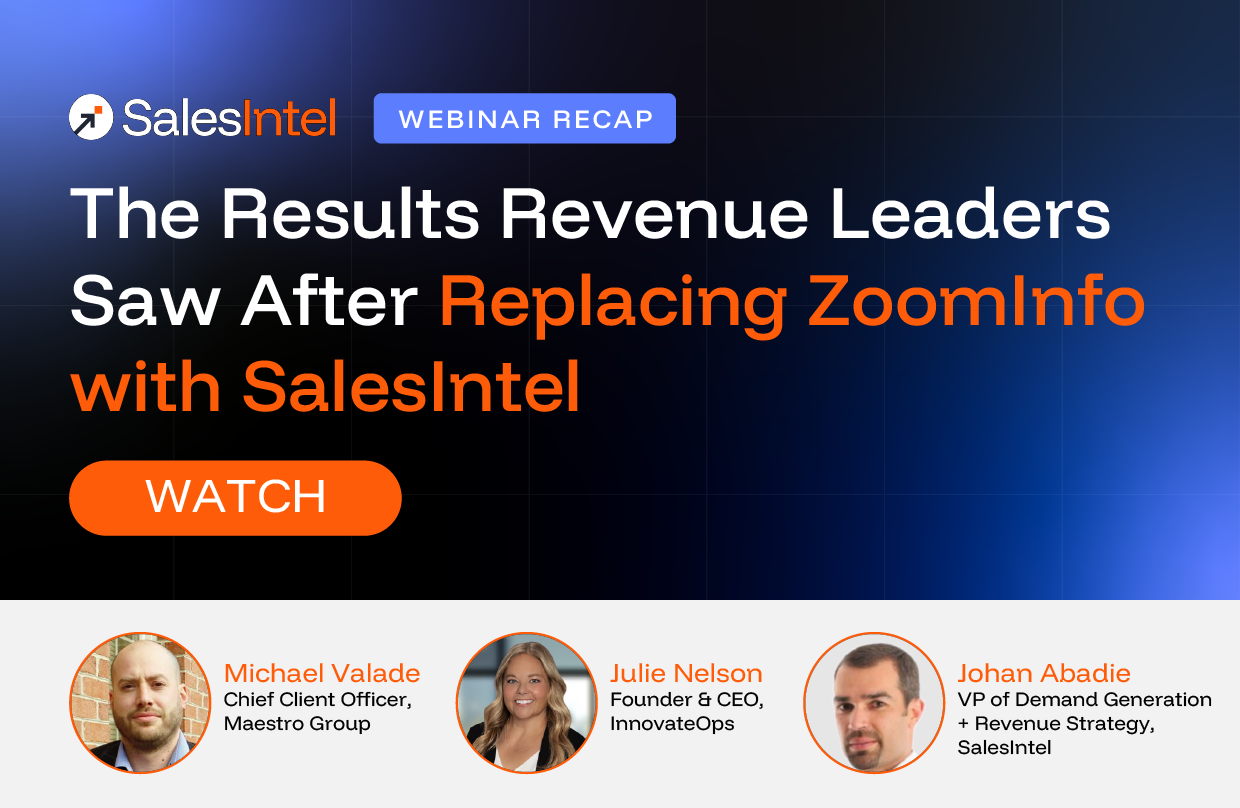All data is not created equal. You need accurate B2B data for effective prospecting, audience segmentation, and CRM ROI.
But when making a B2B data purchase, you have a long checklist to review. Any data provider can give you a lengthy list of names for your sales reps to pursue, but if that data is low quality and the provider has mediocre customer support, your team will struggle. If you want your team to succeed, they need the best tools. Thankfully, this guide is here to steer you in the right direction and share what to look for.
How Can You Be Confident in Your B2B Data Purchase?
You need a good data provider to keep your sales team happy, find your ideal audience, and keep your CRM stocked with valuable data. But how do you know which provider is the right fit for you?
You likely have lots of questions, but to make it easy, let’s focus on quality, coverage, completeness, accessibility, and data types. Here’s what you’ll want to look for and ask about when considering each vendor.
What Data Quality Should You Look for?
Everyone likes to say they have the best data, but what’s the catch?
You should also know what the expectations for the data quality are. No database is 100% accurate. Data decay happens every day as people move and change positions. Make sure you know what level of quality you should expect and if there is a process for reporting inaccurate data for correction.
You should also know how a provider’s B2B data is collected and refreshed – the full verification process. The more detailed the data collection and verification process is, the better the data quality should be. Also, real humans should be involved in double-checking, not just machines.
Does the Data Provider Offer Sufficient Coverage?
The default assumption is that more is better. Why pay for 1,000 contacts when you can get 5,000 for the same price? But, you don’t know how many contacts are relevant to your business. Bigger isn’t always better. If those 5,000 contacts are for companies who won’t be able to use your solution, they’re essentially useless.
Check if the data provider has data for your specific niche. Some target audiences are particularly difficult to find data on. If a B2B data provider has a gap in their coverage, find out if they can get you that data. Can they make your request a priority, or will you just have to wait and see?
Is the Data Complete Enough for Your Needs?
Having incomplete data is common, especially in the early stages of prospecting. But consistently missing crucial data (like emails, mobile numbers, or job titles) might grow into a concern, particularly when reviewing your marketing and sales funnels.
Your teams should determine what information is critical to their functions and determine how to acquire it. Some B2B data providers might not have the same definition of a complete data point you do. You’ll need to ensure that you’re on the same page.
For example, your reps may find that, with many people working remotely, they have the highest connection rate with mobile numbers. When evaluating your provider, are mobile phone numbers included, an extra upcharge, or usually not included? Make sure you’re getting what you need to succeed.
How Accessible is the B2B Data?
“It’s my data, and I want it now!”
You should be able to have the tech stack you want to have and data where you need it. You shouldn’t feel like you’re trapped in any one set or program. Integration with CRMs and marketing tools is the key. How well is the B2B data platform integrated with your existing tech stack? You don’t want to manage different tools separately and constantly switch around while working.
For instance, if you are using Salesforce as a CRM and your data provider is not integrated with Salesforce, you will have to first export the data you want, adjust all the headings in the spreadsheet to match your Salesforce naming conventions, and then upload carefully without creating duplicates.
Check if you can export the data to your email marketing tool and avoid human errors. If yes, how easily can you do it? Do you have to send a support request to export the data, or does it update automatically? Can you manually trigger updates?
Ideally, data providers offer a platform where you can use the data instantly with integrations that include CRM, email marketing systems, and more. Having a native integration enables you to export the contact list directly to your existing tools, preventing human errors while entering the data manually and improving your efficiency.
Your B2B data should be where you want it.
What Different Data Types Should You Consider?
Your options for a data provider likely have more than just contact data. Other B2B data types can accelerate sales development, and are worth the investment!
For instance, firmographic data points help segment your audience based on company details. Where do they operate? How big are they? How many locations are there? All the answers are there.
Technographic data is essential if your product requires an organization to already have a certain piece of software in its tech stack. If you offer an amazing solution that integrates with Outlook, you’d want to be sure that the company isn’t using Gmail instead before you try and pitch.
Intent data lets your team find companies already in the market for your product or services. Additionally, data on recent company news or funding can help sales reps personalize their outreach.
Make sure you understand which features matter to you and how much they cost before you make your B2B data purchase. Different platforms likely have different pricing structures.
You also want to check what the provider’s support and education systems are. Can you have personal training? Do you have access to videos and guides? Extra data features are useless if no one on your team knows about them or how to use them effectively.
What Data Details Are Required to Consider?
Knowing your data needs involves reviewing the following components before picking a provider:
A. Defining your target audience:
- Identification of Ideal Customers:
Clearly define the characteristics of your ideal customers. This includes demographics, industry, company size, location, and any other relevant factors.
- Buyer Personas:
Create detailed buyer personas representing the different segments of your target audience. Understand their pain points, challenges, and needs.
- Decision-Making Roles:
Identify the key decision-makers within the organizations you want to target. This helps in acquiring data relevant to the people who influence or make purchasing decisions.
B. Identifying specific data points required:
- Demographic Information:
Specify the demographic details relevant to your business, such as job titles, company size, revenue, and employee count.
- Firmographic Information:
Determine industry specifics, company type, geographic location, and other firmographic data that align with your target market.
- Technographic and Behavioral Data:
Consider the technologies used by your target audience and their online behavior. This information can aid in personalized targeting and marketing strategies.
C. Establishing data quality standards:
- Accuracy:
Define what level of accuracy is acceptable for your data. This involves ensuring that the information provided is correct and up-to-date.
- Completeness:
Set standards for the completeness of the data. Incomplete information can hinder your marketing and sales efforts.
- Relevance:
Determine the relevance of data to your specific business goals. Unnecessary or irrelevant data can clutter your database and lead to inefficiencies.
- Consistency:
Ensure that the data is consistent across various sources and platforms. Inconsistencies can lead to confusion and errors in decision-making.
- Compliance:
Establish standards for data compliance with regulations such as GDPR or any other relevant data protection laws.
By clearly defining your target audience, identifying specific data points, and establishing data quality standards, you create a foundation for evaluating potential B2B data providers effectively. This ensures that the data you acquire aligns with your business objectives and is of high quality.
What Are the Different Types of B2B Data Providers?
Types of B2B Data providers are an essential aspect of the B2B data purchase guide. Let’s delve into each component.
What Are List Brokers in B2B Data?:
These providers compile and sell lists of contact information based on various criteria. They often aggregate data from multiple sources.
- Industry-Specific Providers:
Specialized in providing data relevant to specific industries, ensuring a more targeted approach.
- General Data Providers:
Companies that collect and combine data from various public and private sources to create comprehensive datasets.
- Data Marketplaces:
Platforms that allow the buying and selling of data, connecting data providers with businesses seeking information.
What’s the Difference Between Industry-Specific and General Data Providers?:
Understanding the pros and cons of different types of data providers can help you approach the right type of data providers:
Industry-Specific Providers:
Pros:
- Highly targeted data that aligns closely with the needs of businesses operating within specific industries.
- Greater likelihood of accuracy as these providers focus on a niche market.
- Tailored insights into industry trends, challenges, and opportunities.
- Highly targeted and relevant data for specific business objectives.
- Greater accuracy and reliability within the chosen industry.
Cons:
- Limited scope if a business operates across diverse industries.
- May be more expensive compared to general providers.
- Limited scope for businesses operating in multiple industries.
- Potentially higher costs due to specialization.
General Data Providers and Marketplaces:
Pros:
- Broader coverage is suitable for businesses with diverse target markets.
- Potential cost savings as general data may be more readily available.
- Flexibility for companies targeting a wide range of industries.
- Offer comprehensive datasets with a variety of data points.
- Can provide quick access to large volumes of data.
Cons:
- Data may be less specialized and detailed compared to industry-specific providers.
- Accuracy may vary as the focus is not narrowed to a specific sector.
- Data quality may vary, as it relies on multiple sources.
- Limited customization options for specific business needs.
Understanding the distinctions and considering the pros and cons of each type helps businesses make informed decisions based on their specific needs and goals when choosing a B2B data provider.
How Do You Choose the Right B2B Data Provider?
Once all is said and done, we’re confident that SalesIntel will be your go-to B2B data provider. Why?
- SalesIntel provides accurate account and technographic data that allows you to quantify and identify accounts in your ideal customer profile.
- SalesIntel offers 95% human-verified data– every contact is verified every 90 days by our team to avoid data decay and maintain accuracy.
- With over 12,000 actively-monitored intent topics, you can easily discover and pursue the targets most interested in your products and services.
- SalesIntel offers the highest number of direct dials and mobile numbers to ensure your sales team can directly speak to the decision-makers bypassing the gatekeeper.
- You can integrate SalesIntel with your existing technology enabling you to export data directly to your CRM.
- You can install our RevDriver Chrome extension to pull prospect data from their LinkedIn profile and company websites.
SalesIntel offers a free research-on-demand feature to our customers. So, if you need data on a specific industry or contact that’s not already in our database, just submit your request, and we’ll find the data for you.
A B2B data purchase with no buyer’s remorse. Schedule a demo today.






